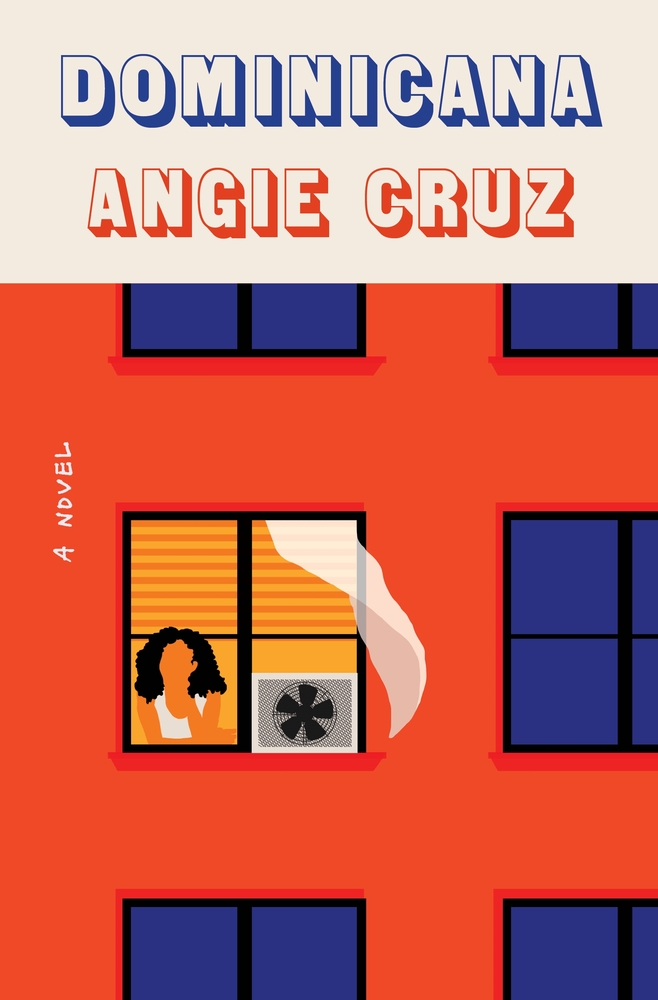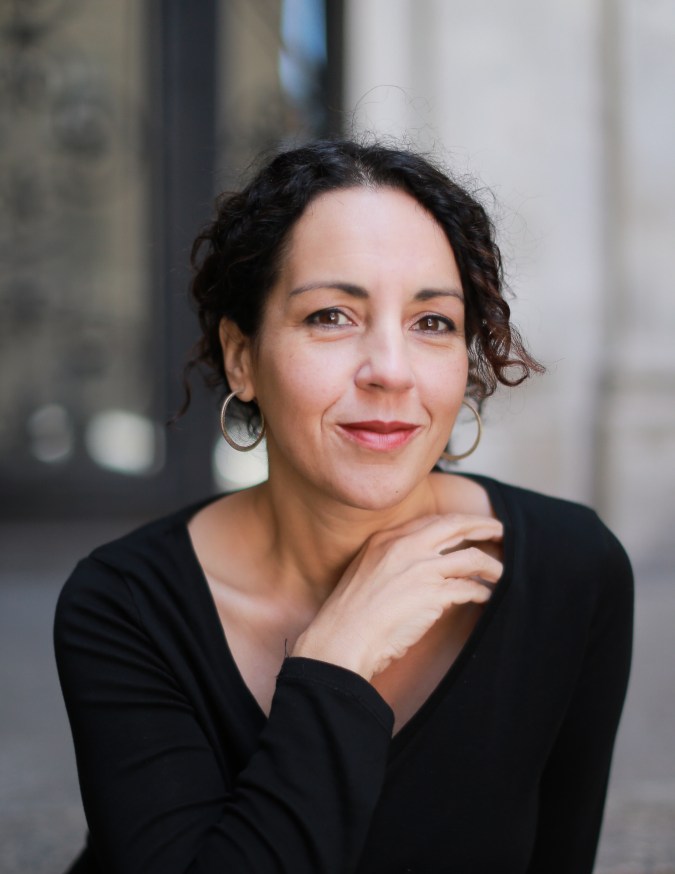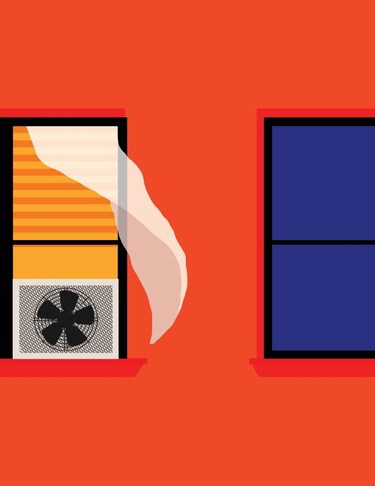Fifteen-year-old Ana Canción doesn’t want to marry Juan Ruiz, a man twice her age who promises to take her from the Dominican Republic to New York. But with her family counting on her to bring them all to the United States, she sees no other choice.
Ana is at the center of Dominicana, Angie Cruz’s forthcoming novel. The story, which takes place in the mid-1960s, follows the teenager as she adjusts to a new country, where she doesn’t know the language or anyone. As her home – as well as everyone she loves – falls into political turmoil, Ana gets her first taste of freedom.
Broken up into six parts, the novel – inspired by Cruz’s mother – will ring true to many.
Below, check out an excerpt from Dominicana.

One kiss and suddenly I’m una mujer. Not a niña or jovencita but a woman. I touch the mirror to understand how it happened without warning, but with the hot-pink dress on, the girl who had never been kissed is gone. I am Ana, about to be married and to travel to America. Juan Ruiz is expected before noon. I look into the distorted mirror at the white lace ruffles around the neckline over and around my shoulders. The dress cinches at the waist and barely covers my knees. Juanita has blown out my hair and tied it back into a bun at the crown with ribbon upon curly ribbon, in white and pink. I put one hand on my waist, shift my hip to one side. Is that really me?
In New York I’ll have a closet full of dresses and jewelry. All kinds of purses and shoes. And Juan will pay for me to go to the salon every week and get my nails done. And he’ll take me to see shows and we’ll go dancing with live bands. And our house will be full of his friends and family. Every day will feel like a party.
Mamá walks into the room carrying her pouch of makeup. Come by the window. The light is better, she says.
I kneel on the floor and lean against her knees. Hold myself up nice and tall so she can study my face.
Look up, she says, and brushes mascara on my eyelashes, then blows into them to dry. She pulls the sides of my eyes and draws a line above them, leaning back for a better look.
I want to see, I want to see, I say, and jump over to the mirror.
Surprise! My eyes are twice as big. My lashes twice as long.
Mamá pats pink cream on my cheeks and curses how dark my skin has become. Even darker after spending time with Gabriel in the pool.
What if Gabriel sees me now? He’d probably think I’m too much woman for him.
Mamá pats red lipstick on my lips and asks me to lick and spread.
But Juan won’t like it, I say.
Just for the photo, she says. So your lips don’t get lost on your face.
She takes a tissue to blot them. A trick she recently learned from a magazine. So it won’t get on your teeth, she says.
I go back to the mirror, thinking of all those times Teresa stole my mother’s makeup and put it on to sneak out at night to meet El Guardia. I smile to show Mamá that no lipstick got on my teeth. We all need some kind of mask.
Mamá makes me sit outside on a wooden bench, under the shade of an almond tree, where it’s much cooler than our house—a real furnace. Teresa, Yohnny, Juanita, and Lenny are off to the beach.
Ana, get out of that dress, Teresa insists. El Guardia will be here any second.
She’s in her bathing suit, a sausage casing, under the oversize men’s shirt she uses for cover.
My little brother, Lenny, already in his cutoff shorts, slaps his sweaty arm against mine.
Gabriel will be there, Teresa eggs me on as if she knows about the kiss.
Oh the fun I will miss, I say, thinking about Mamá’s warning.
Not a hair out of place. Not a speck on the dress or else.
Ooh Gabriel, Lenny teases. I try not to blush.
When he gave me a lift home on his bike, the feeling my mother calls the devil who steals reason came up between my legs. Without reason is how women make mistakes. Big ones, like Teresa, who got caught by the devil the day El Guardia stuck his cucumber inside her and gave her a baby Mamá has to care for.
Go, already, I tell them. Mamá’ll kill me if I get up from this bench.
One time, Yohnny spoke back to her and she hit him with a broomstick so hard he lost consciousness. She did cry afterward for those three, maybe five minutes when we all thought he was dead.
You really want to go away with that old man? Teresa asks.
Her tits sit on her chest like hand grenades.
It’s true, Juan’s old and hasn’t married and has no children. This worries my mother, but he comes from hardworking people who can be trusted. And he’s tall and fair, and his shoes are always polished. Besides, out of all the girls Juan could marry and take to America, he picked me.
Look, Teresa, I finally say, when one’s hungry no bread is too hard to eat. I have no choice.
Teresa takes a small towel from her bag and pats the sweat from around my hairline and neck, her breath fresh from chewing on fennel.
You’re a ghost with all this powder. And this ridiculous dress?
Poor little thing.
I like the dress, I mumble. All my life I wore Teresa’s hand-me-downs although she is wider and shorter than me. She’s probably jealous. The dress smells new, all starchy and crisp.

C’mon, Ana, if the old man wants you he’ll wait until we get back from the beach.
El Guardia’s clunker pulls up. One of the doors has fallen off, but he has temporarily duct-taped it back to the car. Merengue blasts from his radio. He honks on the horn.
You don’t have to marry him, Teresa says, extending her hands. As El Guardia revs the engine she reminds me that Gabriel is waiting for me at the beach.
I touch my lips. Underneath the lipstick, I can still taste his kiss.
Mamá, a real mind reader, rushes out of the house and swats Teresa away with a kitchen towel.
Get away from her. Why do you want to ruin Ana’s life the way you ruined yours?
Mamá turns to me and asks, Do you want to stay here and end up with a good-for-nothing, pigeon-toed, backward man like El Guardia, who can’t even feed his own child? Or do you want to go to New York with a respectable, hardworking man so you can make something out of yourself and help your family?
At least El Guardia loves me, Teresa shouts back, loud enough to cut through the music blasting from the car.
Ay, love, love, love. You children don’t know anything about love or survival. You live in the clouds.
I can’t look at either of them, so I stare at Yohnny, who’s tying a goat to a tree. If he lets her loose she’ll run. She looks at me with longing. I want to pet her.
Teresa’s feet cut the ground, her nostrils flare prepared to hold Mamá back so I can make a run for it.
I bite the inside of my cheek and breathe in the fresh-mown grass, the scent of lilacs and manure, of decayed mangoes fallen from the tree. I listen beyond the arguing and music for the hummingbirds that flap flap flap their wings, for the gravel under Lenny’s feet, for Gabriel’s breath in my ear. At least I kissed him when I had the chance.
El Guardia honks again. He knows not to step out of his car when Mamá’s home. When she first caught his devil eyes on Teresa, she warned El Guardia, if he stuck it into her daughter she would chop off his dick. Everyone knows Mamá can carve a chicken blind.
C’mon, Ana, stand up for yourself.
Teresa pushes, although she knows my marriage agreement was sealed with hard liquor.
Leave her alone! Yohnny calls out to Teresa.
Bully me, and I transform into an ant. I’m not like Mamá and Teresa, who fight for every inch of land and man.
Yeah, leave her alone, Lenny says, and stands in front of me with his arms crossed high on his chest, knowing full well Teresa can flick him away with her pinkie.
Don’t worry, I say. We’ll all be together in New York one day.
You’ll see.
And we’ll ride the subways? Yohnny chimes in. And spickee inglis, Lenny says.
Over there you’ll have no one, Teresa says. No family. No one to protect you. She presses her forehead against mine, our sweat gluing us to each other.
Yohnny karate-kicks the air and splits us apart.
I’ll protect you, he says. I’ll fly there and kick whoever’s ass. A man’s heart in a child’s body, that’s Yohnny.
I hold back from laughing, to not upset Mamá. She counts on me to follow through on this.
Stop it, Teresa. I don’t want to go to the beach, okay!
Teresa rolls her eyes and hugs me as if it’s the last time I’ll ever see her.
Mamá’s so proud of me. Finally I’ve accepted what she knows is the only answer for me.
Enough already. Mamá waves them away. Leave now. I’d rather Juan not see you hooligans being such a bad influence on Ana, Mamá says.
Lenny and Yohnny whoop and holler their way back to El Guardia’s car. They slide into the backseat through the open window and stick their arms out, waving good-bye.
You’re just like Papá, Teresa says, who lets Mamá boss him around.
But even she knows this marriage is bigger than me. Juan is the ticket for all of us to eventually go to America.
The sun bites hard into one side of my face. I try to think of the beach, of the way the waves crash against the rocks, the fun to be had. Of Gabriel and the keys he carries in his pocket. The way he traced my body, his eyes like fingers. I had memorized the ends of his tight curls, his skin an orange-brown glow, as if someone had lit a candle inside of him.
All morning, my father rocks on his chair and smokes his pipe. My mother pokes her head out the kitchen window checking on me, smiling and waving. All her hopes and dreams tie into me. And as if to show me my good fortune—to sit, do nothing in my new dress—she bosses Juanita and Betty to fetch some yucca and batata out back, to wash the sheets, to feed the chickens, and to mop the floors, muddied from yesterday’s thundershower.
You so lucky, they say. Unlike them, I’ve never fantasized about going to New York. They track every dollar bill mentioned in passing conversation and gossip about every American hair clip, pair of shoes, or dresses worn by girls in the area who tease men like Juan in exchange for gifts and opportunity. They all hope for a proper proposal to get to a place where even country girls like us become glamorous and rich.
If there was time Papá would’ve killed a goat and invited everyone in the area to celebrate my departure. Mamá would’ve piled the plátanos and chayote on one serving tray, yucca covered in red onions on another. Yohnny would’ve shared his brew of mamajuana to get everyone loose. The house would’ve been full with neighbors and family. One sip of mamajuana, and I’d be digging my feet into the dirt in my backyard to the beats of the drum and the scraping of the güira. And Gabriel would’ve tried to keep his distance out of respect for Juan. But Teresa would’ve made him dance with me.
What could a kid like Gabriel ever do for me?
And yet we would spin and spin around as if we could turn back time. Stop it somehow.
Oh, I want to be grateful for my fortune. But I don’t want to leave our house in Los Guayacanes painted the color of buttercups by my late grandfather, the only house for miles that has survived all the hurricanes. Our house, the one I share with my parents, Yohnny, Lenny, Teresa, Juanita, and Betty, where there is everything I know and can imagine, for all of my life.

Excerpt from Dominicana by Angie Cruz. Copyright (c) 2019 by the author and reprinted by permission of Flatiron Books. Dominicana goes on sale September 3.




